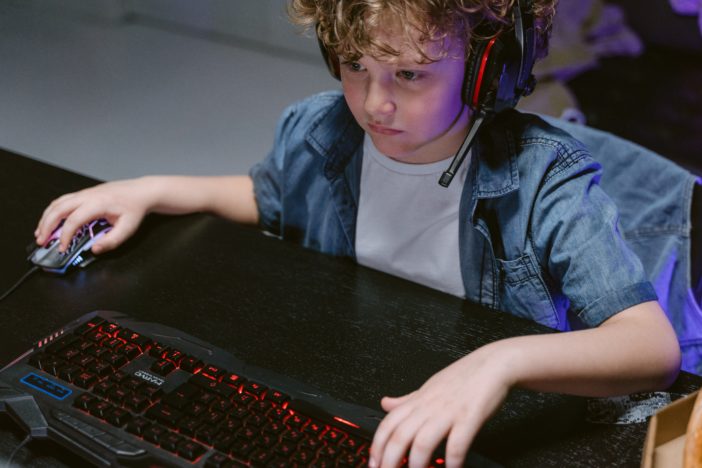The holiday season has passed and if you’re a parent and you or Santa left a video game or other electronic device under the tree, it might be time to revisit device safety guidelines.
There is no doubt that adults and kids alike love their devices. Whether digging through sandbox games, engaging in epic battles or becoming immersed in chat room discussions, there are countless opportunities to interact, compete, and create community.
The flip side, however, can be terrifying. Potential gaming addiction, financial scamming, and identity theft are dangers. There are also particular threats to minors, such as victimization through cyberbullying, and mental and sexual abuse. These are sobering reminders that for all the good, there exist shadows where evil lurks.
To combat online dangers, websites like SafeOC have released guidelines for parents which detail the risks of online gaming. With more than 6.8 billion people on smartphones, 4.3 million on social media, and 3 billion video gamers worldwide, the virtual world has become intertwined with our daily lives and appears to be here to stay. How we interact with and consume media and what we teach children can be the difference between experiencing its benefits and victimization.
Gain control now
For parents, turn on the parental controls on all devices. That is the first and possibly most important thing you can do to help keep a child or teen protected online. Parental controls can be used to monitor and restrict what a person does online.
New devices, such as phones, tablets, personal computers, and games typically include instructions for setting device controls. Free online guides and tutorials can also take you through the steps to set up and customize controls on devices.
Parents should also investigate easy-to-navigate parental control apps and services for their devices. These add-ons to devices, many of which require subscriptions, can keep users up to date and protected in the ongoing cat-and-mouse game between crooks and potential victims. Parental control apps not only help monitor activity, but can control access through web filters, offer location tracking, keystroke tracking, screen recording, and other options.
Numerous parental control app reviews online can give users an idea of services. Other reviews help parents rate the offerings of different apps on specific areas of interest and concern, such as content monitoring or social media tracking.
The importance of safeguarding children and teens is about as hard to overstate as it is to be 100 percent effective.
Talk it out
For every control a parent can place on a device, a child or teen can probably find two workarounds. Rather than trying to electronically outwit children, experts say the best approach is an honest discussion, complete with expectations and consequences.
Clayton Cranford of Orange County is a leading law enforcement educator who frequently speaks at schools and conferences on social media and child safety.
He has developed Cybersafetycop, a website packed with helpful information, tips and contacts. He is also the author of “Parenting in the Digital World: A Step-by-Step Guide to Internet Safety,” which is available from his website or Amazon.
“Parents need to talk to kids about their online behavior,” Cranford said. “There needs to be an open and ongoing conversation with kids about their relationship with the internet.”
While Cranford understands that parents may not be well-equipped to talk about the internet and technology, what they do bring to conversations are the insights gained through life experience.
“You don’t have to be an expert,” Cranford said. “Your kids probably know more about the internet than you do. But you can share wisdom with them.”
Cranford also suggests a parental control that requires no technology. Require the child to give the device to the parent at night and not be allowed to take it to bed with them.
Techless dinners
Another concept Cranford promotes is family gatherings to discuss issues.
“The idea is, as a parent, to find opportunities to do things with kids,” he said. “Family dinners are an organic way to do that. They’re a natural way to corner them.”
He adds that these times should be technology free.
“It’s about using it as an opportunity to ask, ‘How are you?’” Cranford said. “Just be interested and curious.”
Since many children’s lives and mental health issues exist, at least in part, in the digital world, simple conversations can elicit information about potential areas of concern. Given the chance in a safe space in which to engage with parents, many kids will be forthcoming.
Cranford said the dinner table is not the only place for such discussions. If parents can get their children unplugged during drives to and from school and social events, those times together can be valuable.
In those circumstances, Cranford adds that parents can be good role models by likewise disconnecting from technology.
For parents unsure of how to initiate a conversation about online behavior and expectations, Cranford created an internet and mobile device contract. The document, which can be printed and signed, sets down limits and expectations.
It’s not a game
Dozens of internet safety organizations have sites that parents can peruse and share with their children. If it seems time consuming and confusing, consider the stakes.
As citizens, we should look out for each other. That especially applies to online communities. If you suspect a person means harm to others or themself, it’s a duty to let someone know.
If You See Something, Say Something is a valuable resource.
If you are a parent, opening your home to the digital world can be a great thing. But as Spider-Man learned, “with great power comes great responsibility.”
As a parent, Cranford says, “You can set boundaries and address concerns instead of waiting for bad news.”
Too often, Cranford said, he has been in emergency rooms with grief-stricken parents of children who have acted out or been victimized with tragic consequences.
“If the parents had known, they could have done something,” Cranford said. “In my experience, it’s 100 percent preventable or parents could have mitigated it.”
 Behind the Badge
Behind the Badge



